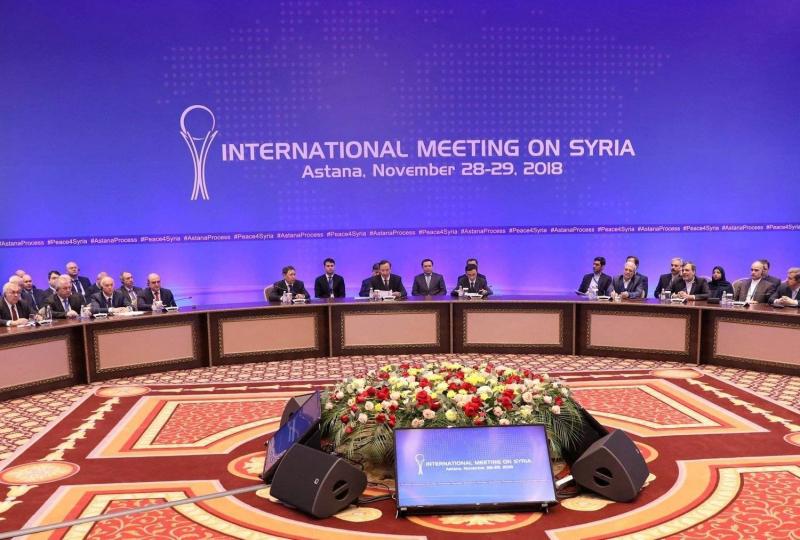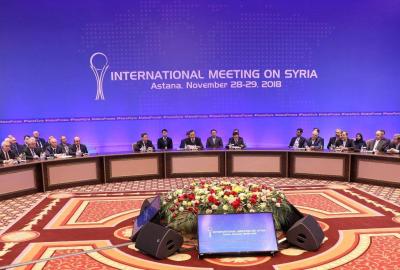Several years ago, international political sentiment was captivated by the Syrian issue due to its significant impact on global security and peace, as well as the ferocity of the conflict that drew major powers into the Syrian arena. This international interest resembled a battleground, especially before the Syrian army took control of Aleppo at the end of 2016, at which point the conflict was at its peak politically and militarily. Discussions among global actors revolved around a singular question: who is closer to victory? Simultaneously, Syrian factions were engrossed in consolidating their positions on the ground to assert their superiority, especially given that the laws of warfare in the Middle East focus on military advancement and territorial control, subsequently engaging in political maneuvering. This led the Syrian opposition—prior to the military balance tipping—to sit at the negotiation table with Damascus, holding two rounds of talks in Geneva I and II, marking the first time the opposition faced the government directly with the presence of an international envoy.
Suddenly, everything collapsed, and the balance of power shifted at the end of 2016 following the Syrian army and its allies' takeover of Aleppo and the loss of the opposition's major strongholds. At that point, international interest evaporated, and the issue reduced to the plight of a handful of refugees and efforts to address this humanitarian tragedy, with hundreds of thousands of Syrians displaced to Turkey, which bore the brunt of the burden. Armed factions exited Aleppo, and the army seized strategic territory, enhancing its international and regional standing. The (Astana Process) emerged at the military level between the opposition and the government, sponsored by Turkey, Iran, and Russia. This phase was one of the most significant upheavals in the trajectory of the Syrian issue, impacting both the political landscape internationally and the influence of the opposition, establishing the notion of 'post-Aleppo.'
This turning point caused the Syrian crisis to drop to the tenth level among global crises, especially after the moral pressure on nations eased, as Turkey absorbed hundreds of thousands of refugees, the refugee flows to Europe declined, and military operations that once shocked the world ceased, allowing many countries to breathe easier regarding the Syrian issue and find their opportunity to gradually withdraw from this complicated file, content with their share.
A Grim Picture and Modest Prospects
Despite the grim picture surrounding the crisis and modest prospects, there have been ongoing attempts to penetrate this stagnation and place the Syrian file back on the international community's agenda. Consequently, the Negotiation Commission has enhanced its tools and transformed the international arena into a venue for active political maneuvers for over a year, particularly in New York during the General Assembly meetings and the meeting with UN Secretary-General Antonio Guterres last September—this being the first of its kind at this level in years.
The Syrian opposition may appear to some as if it has vanished, but the reality is more complex. What has disappeared is the media and international 'trend,' overshadowed by emerging international and regional crises such as the Ukraine and Gaza wars. Nevertheless, the Syrian issue cannot be overlooked, particularly since this crisis operates under the framework of UN Security Council Resolution 2254, which the Negotiation Commission counts on as a key to a solution. This resolution signifies international recognition of a political solution, including from Russia, one of the largest supporters of the Syrian government. Within this resolution lies a clear acknowledgment of two parties to the conflict: the government and the opposition, meaning that any political process or solution in Syria must be anchored in the Security Council decision, thus necessitating negotiation with specific parties for this resolution.
Damascus' Return and the Containment Process
Simultaneously, Damascus returned to the Arab League's corridors and reopened to the Arab world, leading to the formation of a follow-up committee (Saudi Arabia, Jordan, Iraq, Egypt) to find a political solution, which created a new Arab environment pushing for a political resolution and transferring the file to the Arab table. These developments have shifted the issue on new Arab foundations; while it is still early to evaluate, it is clear that there is a path based on containment rather than confrontation with Damascus.
In February 1967—without drawing direct comparisons—the Security Council issued the famous Resolution 242, calling for Israel's withdrawal, which remains part of the solution to the Palestinian issue based on a two-state solution, despite the passage of over half a century. International resolutions do not die or become obsolete with time; instead, they remain the cornerstone for resolving disputes. However, international will is the primary factor in resolving conflicts and establishing peace, and political movement is the essential action needed to restore credibility to the dispute and convince nations that postponing issues will not close the chapters of conflict regardless of how long it takes.
Has the Syrian Opposition Died?
The war has ended, but the crisis remains unresolved, along with certain burdens for nations that have adapted to the costs of the Syrian crisis. But what remains of the Syrian opposition? Many opponents admit they lost golden opportunities before 2016 and that the "game of nations," so to speak, was beyond the capabilities of an opposition that has existed for less than a decade, grappling with a stable state that has extensive international and regional relationships and a profound understanding of Middle Eastern dynamics. Still, despite all this, some within the opposition maintain that time is not over, the crisis is not finished, and there is still much that can be done, as conflicts do not fade away with time. Yet, what can the opposition do, and has it truly died and disappeared from the international scene?
On November 18, the Syrian Negotiation Commission met with 26 international envoys in Geneva, explicitly addressing the international community's shortcomings in advancing the political process and the need to find mechanisms and solutions to the deadlock of 'no war and no peace.'
However, developments in 2023 have led to an untraditional performance by the opposition. The most significant evolution is the European interaction with the Negotiation Commission, which has become a Trojan horse in Europe. Higher-level meetings have resumed following a stagnation that nearly condemned the crisis to the emergency room. After the Geneva meeting, significant discussions took place with influential European figures, and the head of the Negotiation Commission, بدر جاموس, met in November with the political director of the European External Action Service, Enrique Mora—meetings that the opposition had lost entirely over the years, particularly since the dissolution of what was known as the "Friends of Syria" group.




